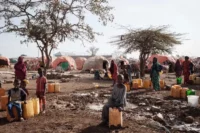
Israel has made Gaza the deadliest place for aid workers
Shaken by a Hamas-led blitz on Israeli communities last October, Israel says it is “determined to dismantle” the military and governance capabilities of the group in besieged Palestinian enclave, Gaza. Yet, this quest has been overshadowed by the war’s devastating effects, which Prime Minister Benjamin Netanyahu has dismissed as “collateral damage”.
Israel’s military campaign has killed over 34,000 people and uprooted 2 million from their homes, out of a population of 2.2 million. The enclave’s northern half is facing the world’s worst famine, relative to population size, of the past few decades.
This is due not only to a shortage of aid, but also to the dangers of and restrictions on movement within Gaza.… Seguir leyendo »
















